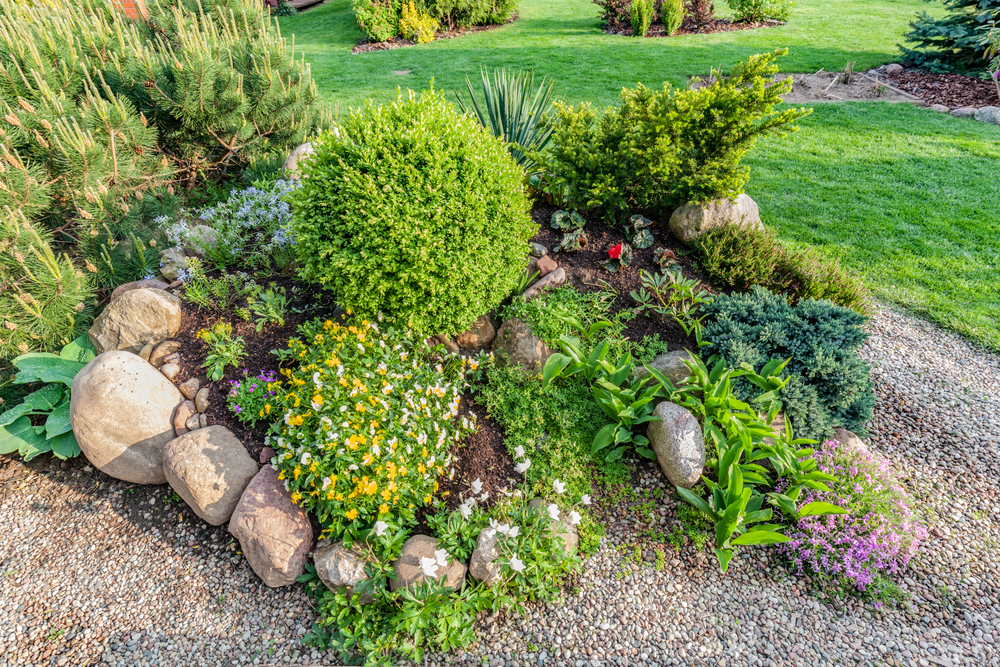
If you think the phrase “landscaping with rocks” sounds kind of like the opposite of what you picture when you think about landscaping, think again! Putting together a landscape design with rocks is a beautiful, low maintenance, organic option that’s only getting more popular—and for good reason. Today we will be discussing some popular landscaping ideas using rocks and tips to make these landscaping options work for you.
1. Stone Paths
There are many ways to add a path to a garden, but when it comes down to it, an overwhelming majority of garden paths are made of stone. Stone is a natural addition to any garden, and its versatility is endless: stone bricks and tiles suit more structured spaces, while more irregularly-shaped stones can be sunk into the soil to make a more cobblestone-inspired path, and of course making a path by setting up low walls or digging a shallow trench and then filling that path with gravel is also an option. The only limit to landscaping ideas using rocks to make stone paths is your access to different types of stones and your imagination!
2. Stone Borders
Larger rocks make a lovely, organic-looking border for patio spaces or any other outdoor space you want to section off from the rest. Although moderately expensive to set up, borders made of larger rocks can be more cost-effective over time since rocks don’t require routine maintenance or deteriorate at the same rate as wood, metal or other more traditional border options. If you want to get creative, rocks can be painted, either solid colors or patterns or even with friendly animal faces—whatever fits your garden’s aesthetic! If large rocks seem like too much, you can build “paths” that are too narrow to walk on to serve as a visual cue to designate different spaces from each other.
3. Rocks as Groundcover
If your yard isn’t ideal for growing grass—it dries out, or gets patchy, or needs to be watered more often than you’re willing or able to keep up with—consider replacing your grass with rocks. It sounds weird at first, but hear us out. Covering your yard with rocks, will save you money with decreased water bills and make your property look unique. If a whole yard full of rocks is going too far, you can place rocks around existing shrubs, trees, bushes, flowers, flower beds, or anything else you’d like to use to add visual interest and draw the eye up from the ground. Another idea is using different colors of rocks in different sections to create a pattern or adding much larger rocks for a Zen garden effect. You’re also not limited to all or nothing with this approach. If there’s a certain area of your lawn that just won’t grow, no matter what, consider making a rock garden in just that section to strategically work around your yard’s idiosyncrasies.
4. Rocks Instead of Mulch
Large gravel works especially well with cacti, succulents and other plants that prefer dry soil since it raises the soil temperature and keeps the ground drier. Using rocks as a replacement for mulch is more cost-effective over time, since they don’t need to be replaced periodically as mulch does, and they’re more proficient at deterring weeds from growing. The trade-off is that rocks can be more stressful for plants than mulch since they don’t add nutrients to the soil and cause the soil to be drier. Even though rocks are the lower-maintenance option, keep in mind that you need to know what kinds of plants work best in this environment and you may need to water your plants more often to keep them properly hydrated. As long as you remember that using rocks instead of mulch will require a bit more attention to watering and compensate for the differences, this could be a good landscaping solution for you!
Whether you decide to add a border to your patio or swimming pool using larger rocks, make a garden path between the flowers with sparkling white stones, or use reclaimed river rocks instead of mulch in your garden, we hope these landscaping ideas using rocks have you thinking about how to incorporate this beautiful, organic option into your garden.
